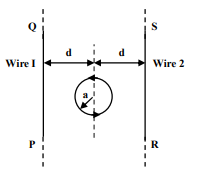Q.
The figure shows a circular loop of radius $a$ with two long parallel wires (numbered 1 and 2 ) all in the plane of the paper. The distance of each wire from the centre of the loop is $d$. The loop and the wires are carrying the same current I. The current in the loop is in the counterclockwise direction if seen from above.

When $d \approx a$ but wires are not touching the loop, it is found that the net magnetic field on the axis of the loop is zero at a height $h$ above the loop. In that case
JEE AdvancedJEE Advanced 2014
Solution: